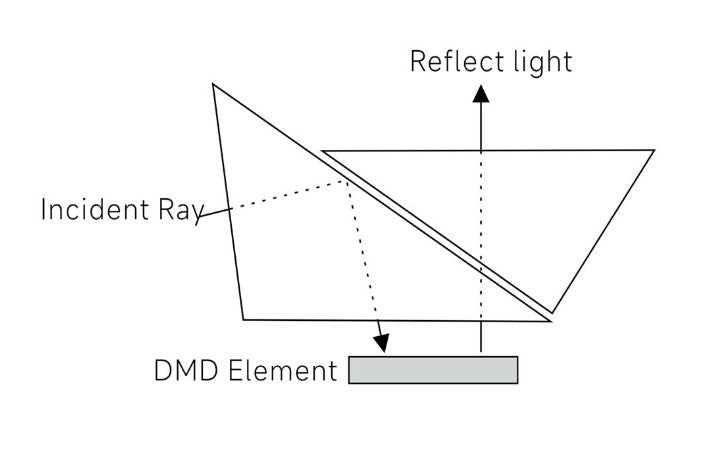TIR prisms, also known as total reflection prisms, are usually made of optical glass, crystal or other transparent materials, and are made up of two triangular prisms, usually with the hypotenuse of one prism (TIR) to separate or change the path of light in a digital projection system, such as illumination beams and imaging beams. This structure allows TIR prisms to effectively control the direction of light propagation, for example by deflecting or focusing light.
First, the working principle
When the light rays hit one of the right-angled faces of the prism perpendicularly, the light will enter the prism in the original direction and be fully reflected on the other right-angled surface, thus changing the direction of light propagation, which can effectively reduce the loss of light and improve the efficiency of light energy.
Second, performance characteristics
High integration efficiency: TIR prisms concentrate and transmit light efficiently, increasing the utilization of light energy.
Small light collection area: Due to the special design of the prism, it can achieve efficient optical performance in a small area.
High light energy utilization: Due to the total internal reflection properties, TIR prisms reduce light energy losses and increase the efficiency of light energy use.
Good uniformity: TIR prisms provide a homogeneous light distribution, so that the light remains stable during transmission.
Low light loss: TIR prisms reduce light loss due to reduced light refraction and scattering, ensuring the quality of light transmission.
Third, the field of application
Optical display field
Laser TV: TIR prism can improve the color purity and brightness of laser TV, and meet consumers' demand for large-size, high-definition, and eye-friendly TVs. As the market for laser TVs continues to expand, so does the use of TIR prisms.
Periscope camera: In mobile devices such as smartphones, periscope cameras use TIR prisms to change the light path to achieve telephoto shooting, meeting the diverse needs of users for camera functions.
Medical endoscopes: TIR prisms are characterized by high integration efficiency and high light energy utilization, which makes them used in medical instruments such as medical endoscopes, providing doctors with clearer and more accurate medical images.
Optical communication
TIR prisms are used in optical communication systems for the transmission and conversion of optical signals, and their efficient light energy utilization and uniformity ensure the stability and reliability of optical signals during transmission. With the continuous development of optical communication technology, the use of TIR prisms in this field will also continue to expand.
Measuring instruments and optical devices:
TIR prisms are widely used in optical devices such as cameras, projectors, telescopes, microscopes, levels, etc., to change the optical path, focus, etc., improving the performance and accuracy of these devices.SiCUBE is a specialist manufacturer of TIR prisms and can offer customized TIR prisms, especially in the field of DLP projection systems.
Solar converters: In solar energy conversion systems, TIR prisms can efficiently concentrate and transmit sunlight, improving the efficiency of solar energy conversion and providing strong support for the use of solar energy.
Medical Instruments and Laser Therapy Devices: TIR prisms are used in medical instruments and laser therapy devices to control the direction and intensity of laser beams and achieve precise treatment, contributing to the development of the medical field.
Other areas
TIR prisms are also used in fingerprint recognition, cloud observation and other fields. For example, in meteorological observations, TIR prisms can be used to observe changes in the shape, properties and air currents of cloud stratus, as well as wind speed and direction.


Share:
USB Camera Module: Five things you need to know
What is USB camera module and how to choose the right one?